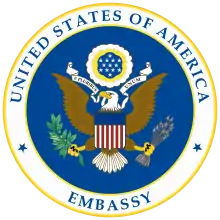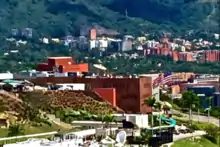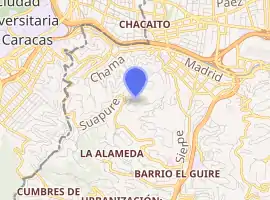Embassy of the United States, Caracas
The Embassy of the United States in Caracas is a United States embassy that represents the United States in Caracas, Venezuela. The embassy provides assistance to American citizens and residents who live in Venezuela and issues visas to foreign nationals, who are Venezuelan and legal residents in Venezuela, who wish to visit or immigrate to the United States.
| Embassy of the United States in Caracas Embajada de los Estados Unidos en Caracas  | |
|---|---|
 | |

| |
| Location | Caracas, Venezuela |
| Address | F St. and Suapure St. Urb . Colinas de Valle Arriba, Caracas, Venezuela 1080 |
| Coordinates | 10.478069°N 66.871371°W |
| Chargé d'affaires | James “Jimmy” Story |
| Website | https://ve.usembassy.gov/ |
The United States has not had an ambassador to Venezuela since July 2010 when Patrick Duddy finished his assignment. Since July 2018, the embassy has been led by the charge d'affaires James "Jimmy" Story, after President Nicolás Maduro ordered the expulsion of Todd D. Robinson in May 2018.
History
Punto Fijo Pact
On 1958, shortly after the overthrow of Venezuelan dictator Marcos Pérez Jiménez, Vice President of the United States Richard Nixon's motorcade was attacked in Caracas during his 1958 goodwill tour of South America. Nixon ended up unharmed and his entourage managed to reach the U.S. embassy.
Two different accounts explain how Nixon's car was ultimately able to escape the mob and continue to the embassy. According to one version of events, the U.S. press corps' flatbed truck, accompanying the motorcade, was used to clear a path through the crowd.[1] In Nixon's remembrance of the incident, Associated Press photographer Hank Griffin at one point had to use his camera to beat back a protester who tried to mount the truck.[2] According to a second account, soldiers of the Venezuelan Army arrived and cleared the traffic, thereafter moving the mob back at bayonet-point to allow Nixon's car to pass.[3]
Shortly after the Nixons arrived at the embassy, the Venezuelan army surrounded and fortified the chancellery, reinforcing the small U.S. Marine guard force. Their assistance had earlier been requested by the U.S. ambassador. That afternoon, members of the ruling junta arrived at the embassy and lunched with Nixon. The next morning, representatives of Venezuela's major labor unions came to the embassy and requested an audience with Nixon, which was granted. The union leaders apologized for events of the preceding day.[4]
Additional activities were canceled, and Nixon departed Caracas the next morning, seven hours early. His motorcade to the airport was protected by a major deployment of Venezuelan Army infantry and armored forces in the capital.[5][6] Nixon described having taken the same route as before, whose streets were empty and heavy patrolled after the whole area had been tear-gassed.[7]
On 17 February 1976, gunmen fired at the embassy from a car, leaving no injuries and causing minimal damage.[8]
Hugo Chávez
During the presidencies of Hugo Chávez and Nicolás Maduro, relations between Venezuela and the United States deteriorated. On 11 September 2008, Ambassador Patrick Duddy left Venezuela after Chávez claimed that he was involved in an American-led initiative to remove him from office.[9] Duddy eventually returned to his position in July 2009[10] but after his assignment ended in July 2010, Chávez refused a replacement for the ambassador, which would be Larry Leon Palmer.[11]
Nicolás Maduro
On 2 March 2015, President Maduro accused the United States of plotting a coup against him and demanded that the Embassy of the United States in Caracas reduce its staff from over 200 workers to 17 individuals within two weeks.[12][13] With about 232,500 applications made through the embassy in 2014, this created fears that difficulties would arise for the demand of visas by Venezuelans.[12] Despite Maduro's orders, the staff did not change at the embassy.[13]
In December 2017, Todd D. Robinson was appointed by President Donald Trump to be charge d'affairs en pied at the embassy in Caracas, Venezuela. In January 2018, Robinson attempted to obtain the release of American citizen, Joshua Holt who had been jailed in the country by meeting with Venezuelan foreign minister, Jorge Arreaza.[14] On 22 May the same year, Robinson and his deputy, Brian Naranjo were expelled from the country as persona non grata by Nicolas Maduro, the newly re-elected president.[15] Days later, Joshua Holt was freed and allowed to return to the USA.[16]
On 23 January 2019, Maduro announced the unilateral breakdown of diplomatic relations with the United States, giving 72 hours to US diplomatic officials to leave the country. The decision came after President Donald Trump recognized Juan Guaidó as interim president of Venezuela.[17] On 12 March 2019, Secretary of State Mike Pompeo announced over Twitter that the US would withdraw all remaining personnel from the embassy within the week, citing the increasingly deteriorating situation in the country.[18]
On 5 April 2019, the United States signed a protecting power agreement with Switzerland to represent its interests in Venezuela,[19] however, the agreement is not yet operational as it has not been approved by Maduro's government[20][21] due to the United States rejecting Maduro's government's proposal to have Turkey as its protecting power as the United States only recognizes Guaidó as interim president.[22][23] In the meantime, the United States has instead established a "Venezuela Affairs Unit" section at the U.S. Embassy in Bogota, Colombia to serve as an interim diplomatic office to Venezuela.[24]
Works
Organized through the embassy, classes teaching the English language are offered at Bi-National Centers in the cities of Caracas, Maracaibo, and Mérida.[25] Poor high school students in Venezuela are also taught English language classes and United States culture through the English Access Microscholarship Program while the Youth Ambassadors Program sends Venezuelan students in high school for three weeks of studies.[25] The International Visitor Leadership Program allows Venezuelan professionals to visit the United States to observe their American counterparts.[25] Due to the approval of the United States by Venezuelans, demand and popularity for such programs are very high and competitive.[25]
The visa system of the embassy works by accepting payments and applications made in advance online.[12] Appointments are then made after applying online, with individuals required to arrive early and wait in line to make sure they fit into their designated appointments.[12] Visa and United States residency applications have increased in recent years.[12]
References
- Glass, Andrew (May 13, 2014). "Vice President Nixon's motorcade attacked in Venezuela, May 13, 1958". Politico. Retrieved March 13, 2017.
- Nixon, Richard (1962). Six Crises. Doubleday. pp. 183–284.
- Summers, Anthony (2001). The Arrogance of Power: The Secret World of Richard Nixon. Penguin. ISBN 1101199482.
- Chavez, Manny (May 3, 2015). "Just Why Did Nixon Go to Venezuela in 1958 Anyway?". History News Network. Retrieved March 14, 2017.
- "Nixon Ordeal". Universal Newsreel. Associated Press. May 1958. Retrieved March 14, 2017.
- Chavez, Manny (May 3, 2015). "Just Why Did Nixon Go to Venezuela in 1958 Anyway?". History News Network. Retrieved March 14, 2017.
- Nixon, Richard (1962). Six Crises. Doubleday. pp. 183–284.
- WikiLeaks cable: 1976CARACA01899_b
- Romero, Simon (September 12, 2008). "Alleging Coup Plot, Chávez Ousts U.S. Envoy". The New York Times. Retrieved 2009-02-08.
- "U.S. ambassador back in Venezuela". UPI. Retrieved 2009-07-03.
- "Without ambassadors, US-Venezuela tensions grow". AP. Retrieved 2011-01-01.
- "Maduro Reprisal Could Clog US Visa Process in Venezuela". Reuters. 4 March 2015. Retrieved 2015-10-30.
- Lee, Brianna (12 May 2015). "US Top Diplomat Returns To Venezuela To Smooth Bilateral Ties". International Business Times. Retrieved 2015-10-30.
- "U.S. Diplomat in Venezuela Raises Concern About Detained American". New York Times. Retrieved 12 November 2018.
- Casey, Nicholas. "Nicolás Maduro Expels Top U.S. Diplomats from Venezuela". New York Times. Retrieved 12 November 2018.
- "Joshua Holt case: US sanctions 'to stay' despite prisoner release". BBC. Retrieved 12 November 2018.
- "Venezuela's Maduro says he is breaking diplomatic relations with U.S." Reuters. 24 January 2019. Retrieved 19 September 2019.
- "U.S. To Pull Diplomats Out Of Embassy In Venezuela". NPR.org. Retrieved 2019-03-12.
- "Schweiz vertritt künftig USA in Venezuela". Retrieved 2019-04-09.
- https://ahvalnews.com/venezuela-turkey/maduros-venezuelan-govt-proposes-turkey-protecting-power-embassy
- https://www.urdupoint.com/en/world/venezuela-proposes-turkey-to-be-protecting-po-622463.html
- http://www.hurriyetdailynews.com/venezuela-proposes-turkey-as-protecting-power-143463
- https://uwidata.com/3684-venezuela-asks-turkey-to-serve-as-a-protecting-power/
- https://www.state.gov/creation-of-the-venezuela-affairs-unit/
- Wisemen, Geoffrey (2015). Isolate or Engage: Adversarial States, US Foreign Policy, and Public Diplomacy. Redwood City, CA: Stanford University Press. pp. 259–277. ISBN 978-0804793889.